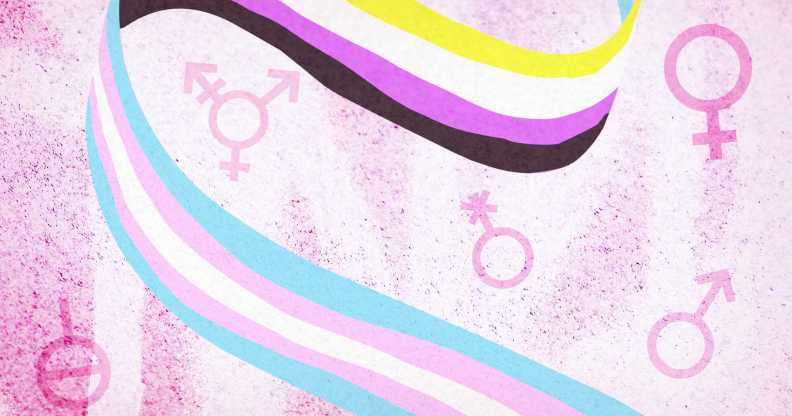UK government has ‘blacklist’ of countries that let people transition ‘too easily’

The UK government is cracking down on countries that make it easier for trans people to obtain a Gender Recognition Certificate. (PinkNews)
The UK government has reportedly drawn up a blacklist of more than 50 countries it claims let people transition “too easily” in a new attack on queer migrants.
According to Whitehall sources, more than 50 countries and US states have been removed from a list of jurisdictions regarded as having sufficiently robust processes for recognising gender.
In November, former home secretary Suella Braverman was sacked following a series of controversial comments and actions including claiming queer migrants were fleeing their home countries out of fear of discrimination rather than actual persecution.
The countries allegedly blacklisted by the UK government include Belgium and New Zealand, with the latter enabling people to self-declare their own gender identity without the need for a medical diagnosis of gender dysphoria.
US states such as California, New Jersey and Maine have also reportedly been placed the Tory government’s so-called ‘blacklist’.
In the Republic of Ireland, self-identification has been a reality since the country passed its Gender Recognition Act (GRA) in 2015.
The reform would mean citizens from the blacklisted counties will be forced to comply with complicated British rules if they move to the UK and gender-recognition certificates (GRC) obtained may not be recognised in this country.
Currently in the UK, obtaining a GRC is a lengthy process which requires the applicant to be at least 18, have spent two years living in their affirmed gender and have ample evidence including official documents using their affirmed name, a medical diagnosis of gender dysphoria and a second medical report.
A Government source, as reported by the Daily Mail, said the move followed the list not being updated for more than a decade, with many countries relaxing their rules.
They said: “Lots of countries are out of kilter with the UK now so this is about redressing the balance and making sure it if someone has a gender-recognition certificate, they have gone through the same process as everyone else.”
The reform comes amid former prime minister Liz Truss vowing to introduce a law that will ban trans women from single-sex spaces and prevent under-18s from transitioning.
Theresa May’s Conservative government promised to introduce self-declaration in 2018, but those plans were quickly dropped under Boris Johnson.
After the Scottish government passed its own reforms in December, the UK government announced its plans to block them, citing issues with the 2010 Equality Act and concerns regarding the safety of women and girls.
Members of the Conservative party have said the party intends to fight the next election on “trans debate and culture wars”, despite research showing that just one per cent of voters saying trans rights will determine their vote in the general election.

